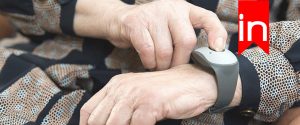Seniors living at home need a medical alert system to ensure their safety and security. As people age, their health can deteriorate, and they may become more prone to accidents and falls. Medical alert systems are designed to provide seniors with a sense of security and peace of mind, knowing that help is just a button press away.
Understanding Medical Alert Systems is crucial for seniors who want to age in place. These systems are designed to alert emergency services in the event of an accident or medical emergency. Medical alert systems typically consist of a wearable device, such as a pendant or bracelet, that is connected to a base unit in the home. When the button is pressed, the base unit sends an alert to a monitoring center, which can then dispatch emergency services if necessary.
The Benefits of Medical Alert Systems for Seniors are numerous. They provide seniors with a sense of security and peace of mind, knowing that help is just a button press away. They can also help seniors maintain their independence by allowing them to continue living at home instead of moving to a nursing home or assisted living facility. In addition, medical alert systems can provide family members with peace of mind, knowing that their loved one is safe and secure at home.
Key Takeaways
- Medical alert systems provide seniors with a sense of security and peace of mind.
- They allow seniors to maintain their independence by living at home.
- Medical alert systems can provide family members with peace of mind.
Understanding Medical Alert Systems
Medical alert systems are devices that provide seniors with a way to call for help in case of an emergency. They are designed to be easy to use and provide peace of mind to both seniors and their loved ones. Medical alert systems come in different types, including in-home and mobile systems.
In-Home Medical Alert Systems
In-home medical alert systems are designed to be used in the home. They consist of a base unit and a wearable device, such as a pendant or wristband. The wearable device is typically waterproof and can be worn in the shower or bath. When the wearer needs help, they press a button on the wearable device, which sends a signal to the base unit. The base unit then contacts the monitoring center, which can dispatch emergency services or contact a designated caregiver.
Mobile Medical Alert Systems
Mobile medical alert systems are designed to be used outside of the home. They consist of a wearable device, such as a pendant or wristband, that has a built-in GPS tracker. When the wearer needs help, they press a button on the wearable device, which sends a signal to the monitoring center. The monitoring center can then dispatch emergency services or contact a designated caregiver. Mobile medical alert systems are particularly useful for seniors who are still active and enjoy going out.
Types of Medical Alert Systems
There are different types of medical alert systems available, each with its own set of features. Some medical alert systems come with fall detection, which can automatically detect when the wearer falls and send an alert to the monitoring center. Other systems come with two-way communication, which allows the wearer to speak directly with the monitoring center. Some systems also come with medication reminders, which can remind the wearer to take their medication at the appropriate time.
Overall, medical alert systems can provide seniors with a way to call for help in case of an emergency. They are easy to use, provide peace of mind, and come in different types to suit different needs.
Features of Medical Alert Systems
Medical alert systems are designed to provide seniors with a quick and easy way to get help in case of an emergency. These systems come with a variety of features that make them ideal for seniors who want to age in place. Here are some of the most important features of medical alert systems:
Fall Detection
Falls are a major concern for seniors, and medical alert systems with fall detection can help. These systems use motion sensors to detect when a senior has fallen and automatically call for help. This feature can be a lifesaver, especially for seniors who live alone and may not be able to get up after a fall.
GPS Tracking
GPS technology is another important feature of medical alert systems. With GPS tracking, seniors can be located quickly and easily in case of an emergency. This feature is particularly useful for seniors who like to go for walks or engage in other outdoor activities.
Two-Way Speaker and Voice Activation
Many medical alert systems come with a two-way speaker and voice activation feature. This allows seniors to communicate with the monitoring center directly and get help quickly. The voice activation feature is particularly useful for seniors who may have difficulty pressing buttons or using other devices.
Activity Tracking
Medical alert systems with activity tracking can help seniors stay active and healthy. These systems use motion sensors to track a senior’s activity level and provide feedback on how much exercise they are getting. This feature can be particularly useful for seniors who have mobility issues and may need encouragement to stay active.
Waterproof and Wearable Devices
Medical alert systems with waterproof and wearable devices are ideal for seniors who like to swim or engage in other water-based activities. These devices are designed to be worn on the wrist or around the neck and can be worn all day, even in the shower or bath.
Medication Reminders
Many medical alert systems come with medication reminders. These reminders can be set up to remind seniors to take their medication at specific times each day. This feature can be particularly useful for seniors who have difficulty remembering to take their medication on time.
Overall, medical alert systems are an excellent choice for seniors who want to age in place. With a variety of features designed to provide quick and easy access to help, these systems can provide peace of mind for both seniors and their loved ones.
Benefits of Medical Alert Systems for Seniors
Medical alert systems are devices that provide emergency monitoring and assistance services to seniors who live independently. These systems are designed to help seniors maintain their independence and remain in their homes as they age. Here are some of the benefits of medical alert systems for seniors:
Safety and Peace of Mind
Medical alert systems provide seniors with a sense of safety and security. They can help seniors feel more confident and secure in their homes, knowing that they have access to emergency services at any time of the day or night. In the event of an emergency, seniors can simply press a button on their medical alert device to call for help.
Independence
Medical alert systems can help seniors maintain their independence and stay in their homes longer. With a medical alert system, seniors can continue to live independently without having to worry about the risks associated with living alone. They can be assured that help is just a button press away if they need it.
Assistance for Caregivers
Medical alert systems can also provide assistance for caregivers. Caregivers can rest easy knowing that their loved ones have access to emergency services at all times. They can also receive alerts if their loved one presses the emergency button, allowing them to respond quickly in the event of an emergency.
In conclusion, medical alert systems can provide seniors with safety, security, and independence. They can also provide peace of mind for caregivers who worry about the safety of their loved ones. With a medical alert system, seniors can continue to live independently and enjoy an active lifestyle while having access to emergency services when they need them.
Cost and Affordability
When it comes to medical alert systems, cost and affordability are major factors for seniors living at home. While the benefits of having a medical alert system are clear, seniors and their families need to consider the cost of the system and whether it fits within their budget.
Price and Fees
Medical alert systems typically come with a price tag that includes equipment fees, activation fees, and monthly fees. The cost of the system can vary depending on the features and services provided. Some systems may offer additional features, such as fall detection or medication reminders, which can increase the cost.
It is important to compare prices and fees of different medical alert systems before making a decision. Seniors and their families should consider what features and services are necessary and what they are willing to pay for.
Insurance and Medicaid Coverage
Seniors may be able to offset the cost of a medical alert system through insurance or Medicaid coverage. Some insurance providers may cover the cost of the system or offer a discount. Medicaid may also cover the cost of the system for eligible seniors.
Seniors and their families should check with their insurance provider or Medicaid to see if they are eligible for coverage. It is important to note that coverage may vary depending on the provider and the state.
In conclusion, while the cost of a medical alert system may be a concern for seniors living at home, there are options available to make it more affordable. Comparing prices and fees of different systems and checking for insurance or Medicaid coverage can help seniors and their families make an informed decision.
Top Medical Alert Systems
When it comes to choosing a medical alert system, there are numerous options available in the market. Here are some of the most reliable and best medical alert systems for seniors who are aging in place:
LifeFone
LifeFone offers a range of medical alert systems that cater to different needs and lifestyles. Their systems come with a lifetime warranty, and they offer a 30-day money-back guarantee. LifeFone also offers mobile devices and a smartphone app that allows users to connect with their monitoring center from anywhere.
Bay Alarm Medical
Bay Alarm Medical is a well-known name in the medical alert system industry. They offer a variety of systems, including landline and mobile options. Bay Alarm Medical also provides lockboxes for emergency responders to access a user’s home in case of an emergency. They offer a 30-day money-back guarantee and no long-term contracts.
Medical Guardian
Medical Guardian is another reliable option for seniors who are aging in place. They offer a range of systems, including landline and mobile options. Medical Guardian also provides lockboxes and a mobile app that allows users to connect with their monitoring center from anywhere. They offer a 30-day money-back guarantee and no long-term contracts.
MobileHelp Duo and Other Mobile Systems
MobileHelp Duo is a mobile system that includes a base unit and a mobile device. The base unit connects to a landline, while the mobile device can be used outside the home. MobileHelp Duo also offers a smartphone app that allows users to connect with their monitoring center from anywhere. They offer a 30-day money-back guarantee and no long-term contracts.
One Call Alert
One Call Alert offers a range of medical alert systems, including landline and mobile options. They also provide lockboxes and a mobile app that allows users to connect with their monitoring center from anywhere. One Call Alert offers a 30-day money-back guarantee and no long-term contracts.
Medical Care Alert
Medical Care Alert offers a variety of systems, including landline and mobile options. They also provide lockboxes and a mobile app that allows users to connect with their monitoring center from anywhere. Medical Care Alert offers a 30-day money-back guarantee and no long-term contracts.
Lively
Lively offers a mobile medical alert system that includes a mobile device and a smartphone app. They also provide lockboxes and a caregiver app that allows family members to monitor their loved one’s activity. Lively offers a 30-day money-back guarantee and no long-term contracts.
GetSafe and Alert1
GetSafe and Alert1 both offer landline and mobile medical alert systems. They also provide lockboxes and a mobile app that allows users to connect with their monitoring center from anywhere. GetSafe and Alert1 offer a 30-day money-back guarantee and no long-term contracts.
Aloe Care
Aloe Care offers a mobile medical alert system that includes a mobile device and a caregiver app. They also provide a voice-activated smart hub that can be used to control smart home devices. Aloe Care offers a 30-day money-back guarantee and no long-term contracts.
When choosing a medical alert system, it is essential to consider factors such as reliability, quality, warranty, customer service, and money-back guarantee. It is also important to consider whether the system requires a long-term contract or not and whether it offers mobile devices and a smartphone app.
Additional Considerations
When considering a medical alert system for seniors living at home, there are additional factors to take into account beyond the basic features and benefits. Below are some important considerations to keep in mind.
Lifestyle and Personal Emergency Response Systems
Seniors who lead an active lifestyle may require a personal emergency response system (PERS) that is waterproof and can be worn in the shower or while swimming. Some medical alert systems offer wearable devices that can be worn as a necklace or bracelet, while others offer a mobile device that can be carried in a pocket or purse. It is important to choose a system that fits the individual’s lifestyle and needs.
Special Needs for Dementia Patients
For seniors with dementia, it is important to choose a medical alert system that is easy to use and understand. Some systems offer voice-activated help buttons, while others have large buttons and simple interfaces. It is also important to consider wandering prevention systems that can alert caregivers if the senior leaves a designated area.
Options for Veterans
For veterans, there are medical alert systems specifically designed to meet their unique needs. These systems may offer additional benefits, such as discounts, priority customer service, and specialized monitoring for PTSD and other mental health conditions.
Overall, when purchasing a medical alert system for seniors living at home, it is important to choose a system with 24/7 monitoring and fire detection capabilities. The system should also be easy to use and provide reliable help buttons in case of an emergency. Some systems even offer heart rate monitoring and integration with Apple Watch. By considering these additional factors, seniors and their caregivers can choose a medical alert system that meets their specific needs and provides peace of mind.
Related Posts

Medical Alert Bracelet For Breast Cancer Patients: Essential Information for Emergencies

Medical Alert Watch With No Monthly Fee

Why Seniors Living At Home Need a Medical Alert System

Activities of Daily Living: A Comprehensive Guide to Maintaining Independence
Sponge Bath: Bed Bathing Seniors


LifeCall is an American company with a long history of providing excellent monitoring services and efficient emergency alert systems to health care facilities catering to the elderly and individuals for use both indoors and on the go all over the United States.
Call Now
1 (866) 225-1295
Read The Review


